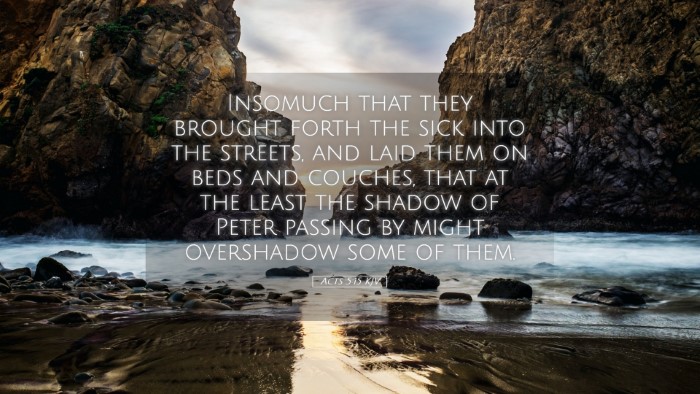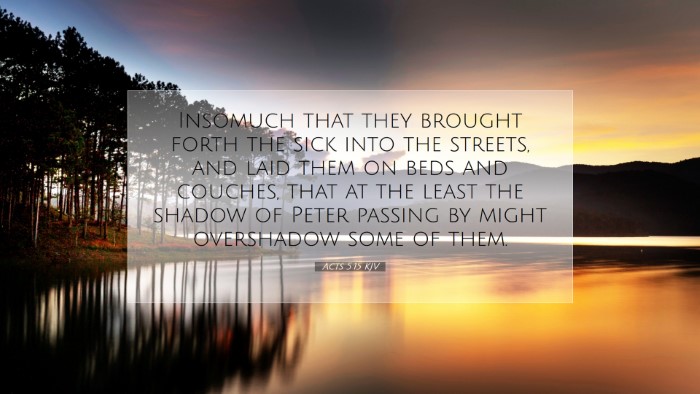Commentary on Acts 5:15
Bible Verse: “So that they brought the sick out into the streets and laid them on beds and couches, that at least the shadow of Peter passing by might fall on some of them.”
Introduction
The passage of Acts 5:15 stands as a powerful testament to the early Church's miraculous works and the significant role of the apostles, particularly Peter. This verse highlights the faith and desperation of the people who believed in the power of God manifested through His servants. In this commentary, we will explore insights from various public domain commentaries to provide a comprehensive understanding of this verse.
Contextual Background
The book of Acts serves as a historical account of the early Church after the ascension of Jesus Christ. Following the Day of Pentecost, the apostles were empowered by the Holy Spirit to preach the gospel, perform miracles, and establish the Church. Acts 5 provides a glimpse into the increasing influence of the apostles and the growing opposition they faced from religious leaders.
Spiritual Significance of Healing
Divine Healing and Faith
According to Matthew Henry, the act of bringing the sick into the streets reflects their faith in the healing power of God. The people believed that merely being in proximity to Peter could lead to miraculous healing. This underscores a key principle in Christian faith: the power of belief in God’s ability to heal, as recognized by Albert Barnes, who states that these actions were driven by a blend of faith and desperation.
The Role of the Apostles
Adam Clarke offers insights into the nature of apostolic ministry during this period. The apostles were not only preachers but also agents of God's miraculous power. The fact that they performed healings and signs confirmed their authority and the divine origin of their message. Peter, as a leading apostle, was seen as a conduit of God's grace, particularly through his shadow, symbolizing the pervasive power of the Holy Spirit.
Symbolism of the Shadow
The mention of Peter's shadow evokes rich theological reflections. Matthew Henry interprets the shadow as a representation of God's presence and influence. Just as shadows are cast in the light, the healing presence of God shone through Peter. The people’s belief that the shadow could heal shows their understanding of God’s power working through His chosen vessels.
Cultural and Historical Implications
This gathering of sick individuals in the streets reflects the cultural context of healing in the ancient Near East. Albert Barnes emphasizes that such public demonstrations of faith were common, and the belief in "shadow healing" was not altogether unusual in the ancient world. However, what set the apostles apart was the true divine authority behind their actions, distinguishing their miracles from superstitions common in the times.
Convergence of Faith and Action
The actions of the people illustrate a significant principle in Christian faith: the convergence of faith and action. They did not merely hope for healing in silence but actively sought out the apostles, demonstrating their belief that healing was possible. Adam Clarke notes that this active seeking reflects a dynamic faith that resonates deeply within the Christian tradition.
Theological Reflections
God’s Sovereignty and Healing
The miraculous healings performed through Peter's shadow raise important theological questions regarding divine sovereignty and human agency. Matthew Henry suggests that while God is sovereign, He often chooses to work through human instruments. The power of healing is ultimately rooted in God, but the apostles, as His representatives, played a vital role in bringing that healing to fruition.
Encouragement for the Church
Furthermore, the early Church's experiences serve as encouragement for modern believers. In a world filled with suffering and need, the call to bring hope and healing remains. Albert Barnes remarks that Christians today are called to be vessels of God's healing power, demonstrating faith through action in their communities.
Pastoral Applications
For pastors and church leaders, Acts 5:15 serves as a reminder of the call to be conduits of God's grace. There are several key applications drawn from this verse:
- Encourage Active Faith: Foster an environment where congregants feel empowered to express their faith actively through prayer, outreach, and community care.
- Model Trust in God’s Healing: Encourage the church to trust in God's healing power, recognizing that He may choose to work through His followers.
- Emphasize the Importance of Community: Just as the sick were brought into the streets, the church must cultivate a community that supports those in need.
Final Thoughts
Acts 5:15 encapsulates a profound moment in the early Church, illustrating both the power of God and the faith of His people. The insights gleaned from public domain commentaries such as those by Matthew Henry, Albert Barnes, and Adam Clarke highlight the theological depth and practical applications of this verse. As we reflect on these truths, may we be inspired to act in faith, bringing hope and healing to a world in desperate need of the love of Christ.


